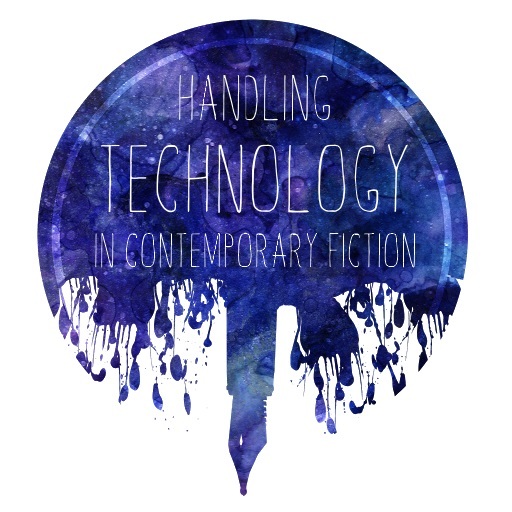And welcome back to
Indie E-Con! If you haven't checked it out yet, it's been awesome! So many wonderful books, so much great advice, so many games and contests that I have no time to play... *sigh*
Voting for the
book awards is still open, and I'm sure any of the authors involved would appreciate your support!
But on to the topic of the day--contemporary fiction. Stop by the main event to get my post on writing a modernized retelling. But in the meantime...

Technology is a tricky thing. On the one hand, it can help to ground your characters in modern-day reality. On the other hand, it can leave your story feeling incredibly dated. On the one hand, it can be a powerful tool for solving difficult story problems. On the other hand, it can hamper your ability to put your characters in the situations your story demands. Okay, I think I’m out of hands here. Actually, I was out of hands some time ago… But you get my point.
While we tend to think of technology as electronics and machines, it’s really broader than that. Pen and paper, pen and papyrus, stylus and clay were each the dominant writing technology at some point in history. But since we’re talking about modern settings here, I’ll stick to looking at technology in the sense that we generally think of it.
Obviously, I can’t cover nearly every facet of technology and how it can be handled in a contemporary story in a single blog post. But here are some general thoughts to get your brain juices going.
1) Think generic
Obviously, it’s impossible to predict all the technological developments that will happen in the next ten years (or five years, or ten days). But as a general rule, talking about technology in generic terms increases the chances that your book will retain its contemporary feel for more than a year after its publication.
For example, let’s say your teenage heroine gets a new phone. Talk about its sleek and graceful design, its lightning speed, and the fact that it gets better service than any of her friends, and kids ten years in the future will probably be able to relate. Start describing new, top of the line features, and you risk seeming a bit dated when those features become standard. Name it an iPhone 7--wait, 8--wait, X?--and you’ve settled your story solidly in a very specific slice of modern history, not to mention running the risk that it will already be dated by the time it goes to print. (Yes, I realize I’m talking to indie authors who can publish in about two clicks. My point still stands.)
This point applies to a lot of the details of your world, but it’s especially relevant when talking about technology. The app that’s been all the rage for months could fizzle out in a matter of days. Today’s cutting-edge innovations could be tomorrow’s bread and butter or be superseded with barely a ripple. Broadly speaking, it’s safer to take a gamble on established technologies (say, cell phones) and generic uses (say, texting or games) than on well-defined features or specific brand names. That’s not to say you can’t write a good story that references specific up-to-the-moment tech; just know that up-to-the-moment may start to feel incredibly dated incredibly fast.
2) Invent your own
Don’t go overboard with this one, but one of the great features of today’s technology for a writer is that it’s constantly shifting and evolving. Anyone know how many new apps are published on a daily basis? (Hey, I asked you first!) If you’re careful, you can leverage this fact to give your characters the little tech boosts they need, even if the real world isn’t quite there yet.
A couple of very important cautions here. First, make sure your invented technology is plausible in a modern-day context. A sensor that lets your hero know when the cat’s water is low probably won’t shock anyone. An app that can turn his phone’s camera into a metal-cutting laser—yeah, you’ve crossed into sci-fi. (Unless you’re writing a spy story, in which case you’re inventing all your own tech anyway, and the rules of the real world don’t apply to you. Also, why are you reading this?)
Second, the more powerful and less innocuous your invented technology, the more you need to justify how your character ended up with it. The cat-watering sensor probably doesn’t need an explanation, but an app that picks up security-camera feeds within a half-mile radius definitely does. If your hero isn’t a programmer himself, he’d better have a hacker friend or a parent in law enforcement or access to the local computer club. Have a well-thought-out plan before giving your characters technology that you’d be surprised to find in your app store.
Finally, don’t mention your invented tech for the first time when your hero uses it to bring down the villain or force the big climax. A surprising use of a phone camera or a music app might work here, but an app or device invented for the purpose will leave your readers feeling cheated. If you need to use invented or unusual technology in a key scene, you need to show it beforehand—preferably in a way that doesn’t seem like a set-up. If your hero needs his digital-clock-override app to defeat the locked vault, make sure we’ve seen him or his little sister using it to prank a friend’s alarm clock!
Invented or non-standard tech can be a useful addition to the contemporary writer’s toolbox, but use it sparingly and with caution if you want to keep your modern setting intact.
3) Admit failure
Let’s be honest; the abundance of modern technology can sometimes be frustrating for a writer. What? No, of course I’m not bitter that my earliest stories now read like historical fiction because they don’t involve cell phones. And can’t involve cell phones, because the plots would shrivel up and die. *sigh*
In a world that’s saturated in technology, we now have to find plausible reasons for things like why our heroine wouldn’t call for backup while following the villain. The answer used to be simple—she couldn’t find a phone. She left a note that blew away in the wind. She gave a message to a little boy, who promptly got called home to dinner. But now? We have to find a way to explain why she didn’t have her cell phone, why she didn’t use her cell phone, or why no one paid attention to her messages.
The good news is, technology fails do happen. (Just ask anyone who’s ever used a GPS.) The bad news is, your readers won’t be satisfied with a technology fail at a critical moment unless you’ve done your work for the set-up. Just because the one day you forgot to charge your phone was the day your boss called about picking up the CEO doesn’t mean your readers will accept that coincidence without explanation.
If you need a technology fail at a key point in the plot, you need to plan ahead. Er—behind? I mean
before the critical plot point. Could you give your hero the habit of forgetting to turn his ringer back on? Have your heroine constantly loaning things to her friend—including her charger? Show the best friend weighing options for a new phone because his gets such poor reception? Better yet, work the explanation into a plot point or an argument or a mini-crisis early on. Let your readers think they know why the issue is important before it’s really important.
The bottom line is, if your readers walk away from a critical tech fail saying, “Well, that was convenient,” you’ve lost respect as an author. If they walk away saying, “Of course he forgot his phone—again!” or “I knew she should have gotten that fixed!” you’re golden. (Or is it silicon?)
Handling technology in contemporary fiction can certainly be a challenge, but overcoming that challenge presents fascinating opportunities to grow and shine as an author. Be aware and intentional, make your characters’ tech work for the story, and keep things convincing for your readers, and you’ll be well on your way to a believable modern-day world—technology included.
Questions or comments? Let me know! I’d love to hear your thoughts. :)
 newest »
newest »
 newest »
newest »
 Great advice! One question on the avoiding-specifics point: what if you're using the specific type of thing to show your readers something about a particular character? In one of my WIPs, I have a character state the specific type of camera he has and a fact about that camera (specifically, that the older version of the camera was used to shoot actual movies and so yes, his fancy camera takes excellent video, thank you). My goal was to show that: (A) he likes to have the best things and can afford to do so, but (B) he's not so set on having the best things that he always has to have the newest best thing, and (C) he's knowledgeable about the stuff he has. Do you think that, in that situation, it's ok to not be generic?
Great advice! One question on the avoiding-specifics point: what if you're using the specific type of thing to show your readers something about a particular character? In one of my WIPs, I have a character state the specific type of camera he has and a fact about that camera (specifically, that the older version of the camera was used to shoot actual movies and so yes, his fancy camera takes excellent video, thank you). My goal was to show that: (A) he likes to have the best things and can afford to do so, but (B) he's not so set on having the best things that he always has to have the newest best thing, and (C) he's knowledgeable about the stuff he has. Do you think that, in that situation, it's ok to not be generic?
 Sarah Taleweaver wrote: "Great advice! One question on the avoiding-specifics point: what if you're using the specific type of thing to show your readers something about a particular character? In one of my WIPs, I have a ..."
Sarah Taleweaver wrote: "Great advice! One question on the avoiding-specifics point: what if you're using the specific type of thing to show your readers something about a particular character? In one of my WIPs, I have a ..." Angie wrote: "Sarah Taleweaver wrote: "Great advice! One question on the avoiding-specifics point: what if you're using the specific type of thing to show your readers something about a particular character? In ..."
Angie wrote: "Sarah Taleweaver wrote: "Great advice! One question on the avoiding-specifics point: what if you're using the specific type of thing to show your readers something about a particular character? In ..." Sarah Taleweaver wrote: "Angie wrote: "Sarah Taleweaver wrote: "Great advice! One question on the avoiding-specifics point: what if you're using the specific type of thing to show your readers something about a particular ..."
Sarah Taleweaver wrote: "Angie wrote: "Sarah Taleweaver wrote: "Great advice! One question on the avoiding-specifics point: what if you're using the specific type of thing to show your readers something about a particular ..." Angie wrote: "Sarah Taleweaver wrote: "Angie wrote: "Sarah Taleweaver wrote: "Great advice! One question on the avoiding-specifics point: what if you're using the specific type of thing to show your readers some..."
Angie wrote: "Sarah Taleweaver wrote: "Angie wrote: "Sarah Taleweaver wrote: "Great advice! One question on the avoiding-specifics point: what if you're using the specific type of thing to show your readers some..."



